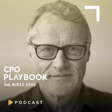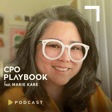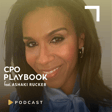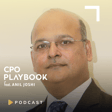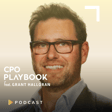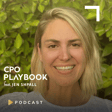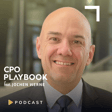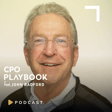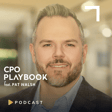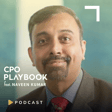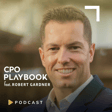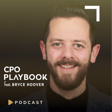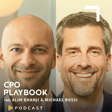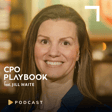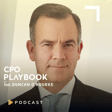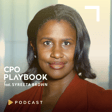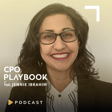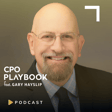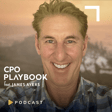Podcast Introduction
00:00:01
Speaker
I'm Felicia Shakiba, and this is CPO Playbook, where we solve a business challenge in every episode.
Employee Well-being and Burnout Insights
00:00:15
Speaker
Gallup says that only 25 percent of U.S. employees strongly agree that their organization cares about their overall well-being. Monique Velcoure, an author of Beating Burnout by Harvard Business Review, shares that those experiencing burnout sense their competencies waning and fret over their ability to excel. It frequently emerges with fatigue and cynicism.
00:00:37
Speaker
since individuals can't operate at their highest potential when their energy is depleted and their connection to work has waned. Gallup also claims that employees who strongly agree that their employer cares about their well-being are three times more likely to be engaged at work and five times more likely to agree that they trust the leadership of their organization.
Self-Leadership with Lori Rudeman
00:00:58
Speaker
Joining us today is Lori Rudeman, a LinkedIn top voice, author, speaker, and podcaster of Punk Rock HR.
00:01:06
Speaker
CNN recognized her as one of the top five career advisors in the United States.
00:01:13
Speaker
Lori, you've emphasized the importance of self-leadership and personal well-being in the workplace. Can you share a specific example from your own life where prioritizing these principles led to a positive transformation in your work experience? Sure. Well, years ago, I used to work at a very small pharmaceutical company by the name of Pfizer. Nobody's ever heard of that, right? You know, not in the news. And I was doing very hard work.
00:01:41
Speaker
And I was heads down for a very long period of time and I was young but married and found myself really letting my own wellbeing go. I was unhappy, was tired, I was sick all the time and I was sore. And when you're 29 years old, you're not supposed to sneeze and throw your back out. And that was happening to me. I really had to take a deep dive and understand what was going on with me. And I noticed that,
00:02:08
Speaker
The less I paid attention to my own individual well-being, the more my work suffered, the relationship suffered, and also just my general overview. None of my friends liked me. Nobody enjoyed always hearing about me complaining about my job. I had a moment at an airport
00:02:25
Speaker
Many many years ago then I write about my book betting on you where I just decided enough was enough. I don't know if you've ever been on a business trip and the only food you can manage to eat for dinner is like an airport snack and that night I was eating starburst and drinking Pepsi at like eight o'clock at night on the layover.
00:02:44
Speaker
And I'm like, why not me? Why can't I eat better? Why can't I find balance? Executives do it. Entrepreneurs sometimes do it. And why not me? And I made a pact with myself that night to turn things around. And it was slow. It required a lot of steps, including therapy.
00:03:05
Speaker
But in the end, it paid off. And about a year and a half later, that's when I decided to go out in the world and bet on myself as a writer and a speaker in the world of human resources. So, yeah, I mean, I think it paid dividends, but there are a lot of steps along the way. And no, I didn't just up and quit my job, which I think a lot of people want to do.
Impact of Team-building on Diversity
00:03:27
Speaker
And in your latest work, you explore the intersection of work and alcohol.
00:03:32
Speaker
challenging traditional team building practices. So could you elaborate on how these practices may affect diversity, equity, and inclusion within organizations and why it might be important to address today? I started my professional career journey in human resources as an intern.
00:03:52
Speaker
I wasn't going to go to law school, didn't know what I wanted to do. And my career group at my university said, go take this internship at an HR job. You'll see everything, sales, marketing, manufacturing, logistics, and maybe you'll find a path. And I did, I found a path in human resources for good or for bad, but that was 1995. So think about it. Bill Clinton was president and the show Friends was on, not even a re-runce, it was on in real time.
00:04:20
Speaker
And back then, the way people kind of came together was through alcohol, through happy hours, through bonding. You know, we'd get beer at the dock at the manufacturing facility. And that's nearly 30 years ago. And the way people get together today is through happy hours and team building with a lot of alcohol. And sure, there might be the opportunity for you to drink a diet coke.
00:04:42
Speaker
But there are a lot of reasons why that old playbook is broken. For many people, they just don't enjoy alcohol. For others, they can't afford to go to happy hour every night with their colleagues. And this idea that we need to come together with alcohol to be visible, to be seen, to be considered for promotional opportunities is exclusive and old. In the journey of exploring all of this, I have found that there are other really good ideas to bring people together, including
00:05:12
Speaker
during business hours when we're getting paid in innovation sprints and really awesome and amazing ways to collaborate so that we don't have to take time out of our schedules to be seen and be promoted in
Vulnerability in Professional Growth
00:05:27
Speaker
the world of work. So yeah, I'm just done with that old way of thinking.
00:05:30
Speaker
If you want to drink, drink. You want to go out, go out. But at least make better, smarter, more honest choices. And I think corporate America and the global corporate landscape can do that for our workforce and actually has an obligation to do it. I love that thinking. I think it's incredibly relevant. There are many people who actually have come up to me and said,
00:05:52
Speaker
Oh, I have to go out with my coworkers and I'm going to be forced to buy a drink, but I don't really drink that much." And those conversations actually happens. To take another deeper dive into what you're sharing in your view, what role does vulnerability play in achieving personal growth and self-improvement in a professional setting? So can you share any experiences where embracing vulnerability, which you
00:06:21
Speaker
already have had a significant impact on your work or life. Well, you know, I coach many executive leaders, both in the C-suite and in the world of human resources. And it's interesting to me because we talk about how culture starts at the top, right, and creating psychological safety in spaces where we can be vulnerable.
00:06:43
Speaker
and express empathy and compassion, and the amount of leaders who are in positions of power who say to me, I can't do that for myself, boggles the mind. And so for me, in my work with these executive leaders, it's really about diving deeper and asking, why can't you do that? Maybe it's
00:07:01
Speaker
board pressures, maybe it's activists at the shareholder level. There are a lot of reasons why they don't feel they can be vulnerable. But until we start at the top, it's absolutely ridiculous to expect that we can create these cultures where people can show up, be seen for who they are and contribute in the best way possible.
Creating Micro-Cultures for Leadership
00:07:21
Speaker
That being said, I'm a big believer in micro cultures, you know, things that happen at the local level. So this is where inner leadership, self leadership,
00:07:31
Speaker
can really do one a lot of good. So even if your executive leadership team doesn't create a culture where you feel like you can show up, even if your CHRO and your chief product officer and your chief revenue officer are all about business and not about being human,
00:07:49
Speaker
You can be human with your peers. You can go first. In fact, there's a lot of reasons why you should go first because a lot of times the groundswell for promotion, the groundswell for someone being elevated at the local level happens at that peer-to-peer level.
00:08:05
Speaker
So you don't have to come to work and be so vulnerable that people think you're weird, but you can start to share just even 10% more. And in the eyes of your colleagues, in the eyes of your peers, and even in the local vendor community that you operate in, that can be enough.
00:08:21
Speaker
to start to propel your career journey forward. So don't go whole hog, don't go 100%, just try 10% and see how that feels and get some feedback along the way. That's what I recommend. What does that 10% look like? Because I feel like there's a gray area. What does that actually look like? What do you mean by 10%? It could mean absolutely canceling a meeting if you're in a position to do that because you're not feeling it and talking about it.
00:08:49
Speaker
It could mean simply ending a meeting early or it can mean when someone is late for a meeting, taking them offline, just appear and say, you're late for a meeting. And I mean, I showed up on time. It was really difficult. I just wanted to give you the feedback that when you show up late, you hold everybody back. And I want to understand why you made that choice. It can mean a lot of different things, but
00:09:13
Speaker
Being brave and being bold is the key differentiator at any level on your career path. So if you don't do it and you wait for other people to do it, it may never happen. And I'm here to tell you that the story you're telling yourself about, you can't do it. You can't just do 10% is a false story. And if you get fired, if you get dinged, if you get held back, well, that's a good indication.
00:09:38
Speaker
that you shouldn't be there in the first place and it's time to move on. So I'm trying to help people move from self-imposed victimhood to a place of greater freedom. And I think so many of us have more privilege than we've recognized, than we admit, and it's time to bet on ourselves and take a risk. 10% is not a lot to ask for.
00:09:59
Speaker
And the thing that you'll gain with making that 10% move is greater than you can ever anticipate. I know this for a fact. I've been coaching people now and working with people for almost 30 years.
HR Practitioners and Personal Integrity
00:10:11
Speaker
And these self-imposed limitations, well, it's time for them to go. You've mentioned before that you no longer focus on HR, but on the practitioner. What does that mean exactly?
00:10:25
Speaker
I don't have any illusion that one woman, no matter how big or mediocre in my case or platform is, can fix work. I think we fix work by fixing ourselves first. And so if I can be helpful to an HR leader individually or an HR practitioner, that's where I'm going to go. I feel like for so long, HR has forgotten that they're employees too.
00:10:50
Speaker
their employee experience matters, that they're not floating between executive leadership teams and the workforce. They are the workforce. So if I can get down to a very practical level with an HR director, an HR VP, even an HR business partner, it's my goal to do that. You know, we often wonder why the workforce is so angry and yet we complain about our own jobs, right? Well, start there.
00:11:14
Speaker
try one thing a quarter that's bugging you, like try attacking that. And if you could fix that for yourself, it has a positive downstream impact for the rest of the organizations. In my work when HR leaders and HR practitioners complain about things like childcare, well, let's look at childcare. Let's look at benefit your company does or doesn't offer and see if we can improve that even incrementally, because if we fix it for you, we're gonna fix it for hundreds of people.
00:11:44
Speaker
The concept of work-life balance has evolved in recent years as you're sharing with us now. How do you define and approach this balance? How do you suggest organizations approach creating a culture where employees feel like leaders care about their well-being, especially when many organizational cultures tend to reward the after-hour worker? Such a good question. For years,
00:12:12
Speaker
I took on this paternalistic tone where I thought employers should absolutely meet the needs of the workforce in, I think, soft and amorphous ways. And we saw that really hit its high note during COVID where it was like, we want you to feel good. Let's talk about our feelings. Let's create these spaces where everybody can come together. As we come out of the pandemic, I've almost done a 180.
00:12:38
Speaker
I think if we give our workforce the space and opportunity to do great work, if we put in front of them meaningful tasks and amazing challenges, and we actually give them the space to do that,
00:12:54
Speaker
We do give them work-life balance because what we're saying to them is, nothing else matters except this really important work that we need you to do.
Rethinking Work-Life Balance
00:13:04
Speaker
Nothing else matters except you doing your best, you being excellent, and everything else we're willing to have a conversation about. Do we need greater automation? Do we need better
00:13:14
Speaker
clarity on the working hours that you have. Do we need to reconfigure and rethink our team structure for you to do this amazing work? I think if we focus on doing that excellent work, the balance can follow, but it's this ongoing conversation.
00:13:29
Speaker
But this idea that I'm going to make you feel good about your childhood and about what's happening in the world is so paternalistic, it's so condescending, and I'm ready to ditch some of that language for the language of tackling meaningful problems in this world.
00:13:47
Speaker
In your book, you talk about integrity as a fundamental element of self leadership. Could you share your perspective on how individuals can maintain their integrity in environments that might not always align with their own values?
00:14:03
Speaker
Well, integrity is really the core of everything, not just your professional life, but your personal life. You have to know who you are and what you stand for and also what you won't stand for. What are the non-negotiables? And I think sometimes we do these exercises, maybe when we meet with the EAP or we come together as a team, but we don't mean it. We don't explore it regularly. So understanding who you are, what you stand for and what you won't stand for,
00:14:29
Speaker
is a monthly, is a weekly, is a daily activity. And something that I do all the time when people ask me to do things, I'm like,
00:14:37
Speaker
Where do I stand? What do I believe in? Right? But it's a practice. Kind of like any good thing in life is a practice. Like exercise is a good practice. Eating according to the way your body needs to be fueled is a practice. Nobody can do this for you. Nobody can make time on your calendar for this, for you, except you. So integrity being at the core of everything is super important. And I think
00:15:02
Speaker
Sometimes we go into work environments and it tests our integrity and we think we can change it. And there's a lot of good research out there from Bob Sutton, from Amy Edmondson, from all the leaders, all the great thinkers. My friend, Minda Hartz does amazing work on this, that the environment is more likely to change you negatively than you are to change the environment. The most important thing
Integrity in Non-Aligned Environments
00:15:27
Speaker
you can do when you feel like your integrity has been challenged
00:15:31
Speaker
is to get the heck out. You don't have to leave today, you don't have to leave tomorrow, but have a plan of action so that you don't continually face these, I think, attacks on your body, your mind, your spirit, your soul and you've got a way out. And it could be
00:15:48
Speaker
through focusing on continuous learning. It could be by working on yourself through your health insurance and your personal welfare benefits that you get through an organization so that you're eventually in a good place to leave. But take advantage of all the benefits that are afforded to you in that
00:16:05
Speaker
job that's crushing your soul, that's challenging your integrity, so that when you're ready to move, you're moving towards something and not away from something. You mentioned before that you're more selective about the leaders you work with. What qualities or characteristics do you look for in leaders who are genuinely committed to improving the well-being of their employees?
00:16:26
Speaker
I look for vision, and one of the really important things that I do in my intake and my onboarding process as a coach and just as a person who wants to have good friends, right? I want to align myself with people who have a vision for what the future of work looks like. I'm not expecting them to fix things. I expect them to be realistic. We all have to collude with capitalism in our own way, no matter where we are on the planet. But I want someone who knows what the promised land looks like.
00:16:55
Speaker
what it looks like to work with a great team for them, what it looks like to build great teams and to articulate it in a way that's persuasive and not just puppeting some language out there from great leaders. I want someone who can take me through a vision of their day, a day that looks rewarding and a day where they make a contribution. Those are the people I work with. So when I put out a call like, I'm accepting a couple new people in a cohort,
00:17:23
Speaker
I'm in an active conversation with these people and also I do something that's a little bit different than other coaches. I have a writer in my clause that says, if at any point I feel like you need therapy or you need an intervention, we're going to stop our work together and we're not going to start again until you see a therapist.
00:17:44
Speaker
I have people sign that all the time and I live that value and then they fight me like, well, we only have two sessions left. Can't we do those two sessions? No way, not until we move forward with a real plan for getting you what you need and it's not me.
00:18:00
Speaker
It's a different process, but I think it's a good one. I have good feedback on it. Well, I would imagine that someone who needs that personal therapy, it would be very challenging to get your work done as a professional if they didn't go through that first.
00:18:16
Speaker
it's such a waste of time to figure out who you are and what you stand for at work and where your career is headed if you're having panic attacks before going into work, which is very common. The amount of men and women who feel a sense of dread at the executive level, who feel a sense of dread and a sense of panic regularly is just offensive to me that people put themselves through that. The other thing, on a very practical level, executives more and more feel like regular workers
00:18:45
Speaker
They can't disconnect from technology. They feel like they're always on. I was recently at the HR technology conference and heard a statistic that 77% of executives feel like they're always on. They never get a break.
00:18:58
Speaker
And if that's how a leader feels, imagine how someone feels on the customer service line or on the packaging line, right? Or even just working in procurement. If your leaders are stressed and overwhelmed, it's a terrible cascading effect down to the regular workforce. Tackling that is more than just coaching. It's really about rethinking your life.
00:19:19
Speaker
in total, and I can't do that. I don't have a PhD in psychotherapy, but I know people who do. Your approach seems to encourage individuals to take charge of their work experiences.
Strategies for Personal Well-being
00:19:30
Speaker
What strategies or techniques do you recommend for someone who wants to initiate a positive change in their work environment, even if they're not in a leadership position?
00:19:39
Speaker
Yeah, well, I do like the activity of recognition and reflection. So understanding who you are and what you'll stand for and what are non-negotiables in your life. That's a quick and easy exercise that you can put on the calendar to do weekly. So how do you stink critically? How do you have good cognitive abilities if you're not sleeping and you're not fueling your body right?
00:20:04
Speaker
The amount of women I know who are on a diet of Diet Coke until about two in the afternoon is just unfathomable. Like, I don't know, they wake up, they may have a cup of coffee, but they're on Diet Coke, they miss breakfast, they miss lunch, if they eat anything at all, if they work from home, they're eating off their toddler's plates or their children's leftovers, right? How can you make a good decision when
00:20:26
Speaker
calorically, you're not fueling your brain. Just to get through the day, science says, at the very minimum, just to function and keep our organs moving, we need 2,000 calories. I don't know many women who are getting 2,000 calories, good calories a day, or they're stacking their calories until late at night when the work is done and they're making big meals for their family members and it's like a calorie bomb late in the evening and they wonder why they're not sleeping right. So really,
00:20:56
Speaker
getting good nutrition is important. When I talk to people who absolutely say they're burned out, we don't pursue coaching until we understand their body batteries. Again, people over the age of 35, over the age of 40 who haven't had a physical in years, it's like, you can't work with me unless you get a physical. That's brass tacks. So you don't have to get coaching to get a physical. Go get a physical. This is what your health insurance pays for. Go ahead and do that. I mean, if you're
00:21:25
Speaker
listening to this podcast, you absolutely have that benefit. Go pursue it and understand where you are because if your body is not operating at an optimal level, your heart, your mind and spirit are not going to operate at an optimal level. So go get that physical. Is there anything else that you feel would be good for our listeners to know or learn?
Personal Growth Through Hobbies
00:21:48
Speaker
I think every successful executive I know has a hobby. They do things outside of work. And actually, Harvard Business Review, Stanford, Cornell, they've all done immense studies. Michigan State, Michigan have done amazing studies on the impact of learning outside of your personal domain on your domain. So
00:22:10
Speaker
If you're learning, you're growing. If you're growing, you're thriving, and that's what life is all about. And if you're learning about things outside of your predominant domain, so if you work in human resources and you're learning about flower arranging, it's amazing how your body and your mind make new connections and you bring that energy and that cognitive mapping
00:22:34
Speaker
to the work that you do on a daily basis. So whenever I work with someone, I absolutely insist like a maniac that they go get a hobby. Like you can't just do HR, you can't just do leadership alone. So I've worked with executives and I share this story all over the place. One in particular I was very moved by. He was really in his job all the time and it was making him cranky and he wanted to leave and he wanted to become a consultant.
00:23:03
Speaker
I said before you do that, let's like pick a hobby and do that for 30 days and keep a learning journal. And so he said, well, you know what? I've wanted to work on perfecting my brisket. Okay. All right. I'm in this. Yeah, I was a vegetarian at the time, but I'm still in it. And so he went on this 30 day journey of really grilling out more, perfecting his brisket, doing things he needed to do and a couple of things he learned. Not only did he learn,
00:23:28
Speaker
patience and he learned, of course, the ability to fail and laugh at himself. But he spent more time cooking, which meant he spent less time on his phone and he spent less time working. He also spent more time with his family and community, feeding them food that he made with love by hand and getting silly feedback and input on his technique and input on his rub and his timing and all of that.
00:23:53
Speaker
And if you know anything about cooking a brisket, you can't do that in 20 minutes. This is a labor of love, right? So this is something that freed his brain to think in different ways. It's almost like when you take a long shower and suddenly you have a good idea, brisket was his long shower.
00:24:09
Speaker
But I've also worked with women who used to be ice skaters when they were kids and they went out and laced up their skates and started skating again and didn't do it well and fell a bunch of times but really enjoyed it. So there's a lot of lessons to be learned from learning in other ways and also taking those stories back to work.
00:24:28
Speaker
It makes you a wholly differentiated individual. And honestly, it helps remind people around you that you're fun. So anybody can do this. Anybody can go on a 30 day learning journey and just write it down, the good, the bad, the ugly, reflect on it. And I guarantee you, it's a fun experience and it actually deprioritizes work and prioritizes you. It helps you put yourself at the center of your own story. And we all need that.
00:24:57
Speaker
Lori, it's an honor to have you on the show. Thank you so much for being here. I'm going to go perfect my brisket now. I love it. I encourage you to do that and I'm ready. I'm eating brisket again, so invite me over anytime.
00:25:14
Speaker
If today's episode captured your interest, please consider sharing it with a friend or visit cpoplaybook.com to read the episode or learn more about leadership and talent management. We greatly appreciate your rating, review and support as a subscriber. I'm Felicia Shakiba. See you next Wednesday and thanks for listening.

